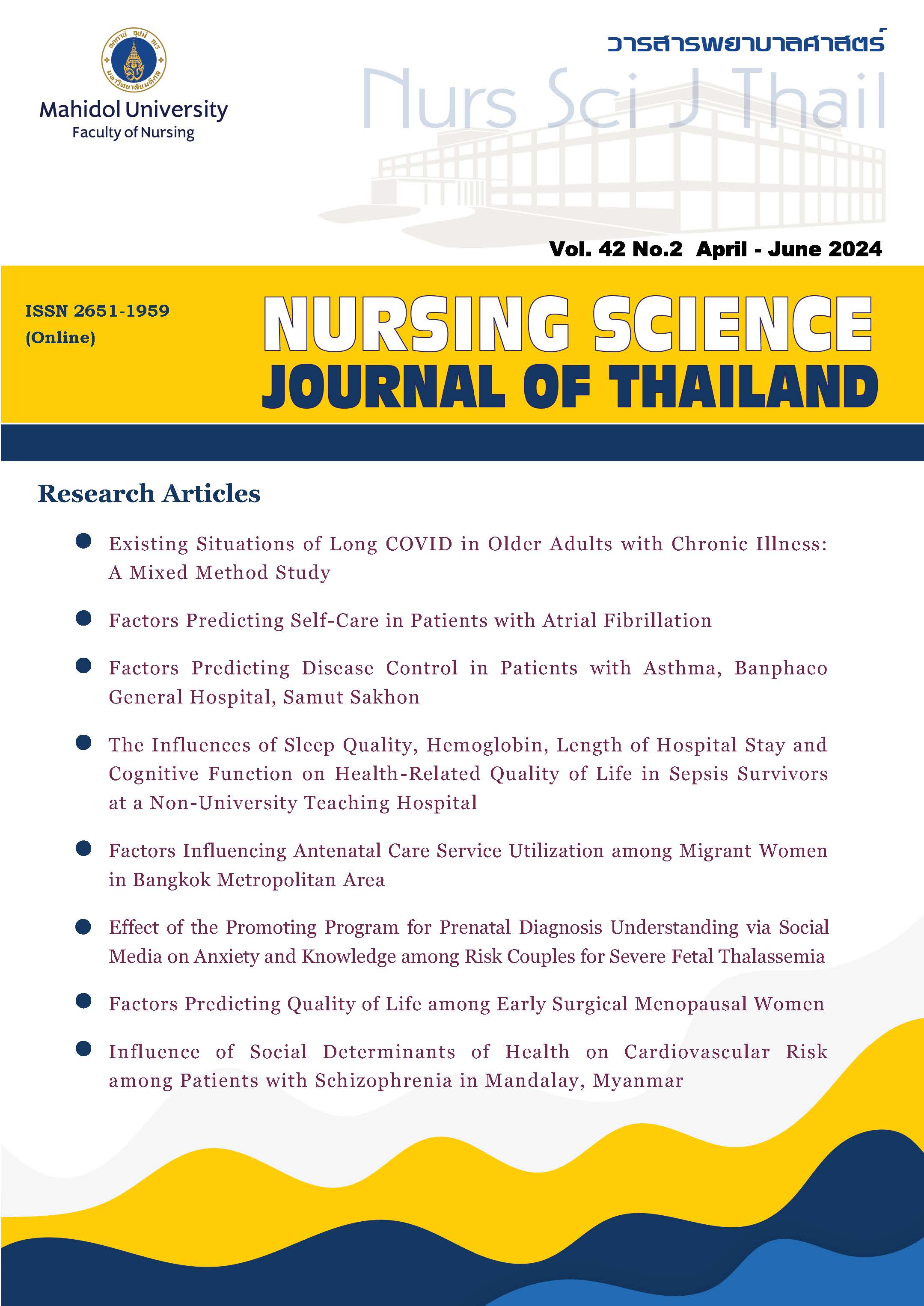Factors Predicting Quality of Life among Early Surgical Menopausal Women
Main Article Content
Abstract
Purpose: To study the predicting factors on quality of life among early surgical menopausal women including education, occupation, income, perceive general self-efficacy, self-care, and social support.
Design: Predictive correlational study design.
Methods: The participants consisted of 113 early surgical menopausal women who came to follow-up after surgery at the obstetric-gynecological clinic at a university hospital in Bangkok during March 2022 until May 2023. Data were collected using a demographic questionnaire, General Self-Efficacy Questionnaire, Menopausal Self-Care Questionnaire, Multidimensional Scale of Perceived Social Support and the Menopause-Specific Quality of Life Questionnaire. Descriptive statistics and multiple linear regression were applied to the data analysis.
Main findings: The results revealed that all factors could explain 39.2 % of the variance in quality of life (R2 = .154). The factors that significantly predicted quality of life among early surgical menopausal women were surgical menopausal symptoms ( = .275, p < .003) and perceived social support (
= - .256, p < .024).
Conclusion and recommendations: Healthcare team should promote family, friends and significant persons to support the women in early surgical menopausal period and try to promote them how to reduce surgical menopausal symptoms for increasing their quality of life.
Article Details

This work is licensed under a Creative Commons Attribution-NonCommercial-NoDerivatives 4.0 International License.
Copyright Notice: Nursing Science Journal of Thailand has exclusive rights to publish and distribute the manuscript and all contents therein. Without the journal’s permission, the dissemination of the manuscript in another journal or online, and the reproduction of the manuscript for non-educational purpose are prohibited.

Disclaimer: The opinion expressed and figures provided in this journal, NSJT, are the sole responsibility of the authors. The editorial board bears no responsibility in this regard.
References
World Health Organization. Menopause [Internet]. Geneva: WHO; 2022 [cited 2024 Jan 15]. Available from: https://www.who.int/news-room/fact-sheets/detail/menopause.
C Pillay O, Manyonda I. The surgical menopause. Best Pract Res Clin Obstet Gynaecol. 2022;81:111-8. doi: 10.1016/j.bpobgyn.2022.03.001.
Kingsberg SA, Larkin LC, Liu JH. Clinical effects of early or surgical menopause. Obstet Gynecol. 2020;135(4):853-68. doi: 10.1097/AOG.0000000000003729.
Lee J, Han Y, Cho HH, Kim M-R. Sleep Disorders and menopause. J Menopausal Med. 2019;25(2):83-7. doi: 10.6118/jmm.19192.
Cho NY, Kim S, Nowakowski S, Shin C, Suh S. Sleep disturbance in women who undergo surgical menopause compared with women who experience natural menopause. Menopause. 2019;26(4):357-64. doi: 10.1097/GME.0000000000001257.
Stuursma A, Lanjouw L, Idema DL, de Bock GH, Mourits MJE. Surgical menopause and bilateral oophorectomy: effect of estrogen-progesterone and testosterone replacement therapy on psychological well-being and sexual functioning; a systematic literature review. J Sex Med. 2022;19(12):1778-89. doi: 10.1016/j.jsxm.2022.08.191.
Page CE, Soreth B, Metcalf CA, Johnson RL, Duffy KA, Sammel MD, et al. Natural vs. surgical postmenopause and psychological symptoms confound the effect of menopause on executive functioning domains of cognitive experience. Maturitas. 2023;170:64-73. doi: 10.1016/j.maturitas.2023.01.00.
World Health Organization. The World Health Organization Quality of Life (WHOQOL) [Internet]. Geneva: WHO; 1998 [cited 2021 Mar 9]. Available from: https://www.who.int/publications/i/item/WHO-HIS-HSI-Rev.2012.03.
Namazi M, Sadeghi R, Behboodi Moghadam Z. Social Determinants of health in menopause: an integrative review. Int J Womens Health. 2019;11:637-47. doi: 10.2147/IJWH.S228594.
Nazarpour S, Simbar M, Ramezani Tehrani F, Alavi Majd H. Factors associated with quality of life of postmenopausal women living in Iran. BMC Womens Health. 2020;20(1):104. doi: 10.1186/s12905-020-00960-4.
Weidner K, Bittner A, Beutel M, Goeckenjan M, Brähler E, Garthus-Niegel S. The role of stress and self-efficacy in somatic and psychological symptoms during the climacteric period – Is there a specific association? Maturitas. 2020;136:1-6. doi: 10.1016/j.maturitas.2020.03.004.
Karimi L, Mokhtari Seghaleh M, Khalili R, Vahedian-Azimi A. The effect of self-care education program on the severity of menopause symptoms and marital satisfaction in postmenopausal women: a randomized controlled clinical trial. BMC Women Health. 2022;22(1):71. doi: 10.1186/s12905-022-01653-w.
Aloufi B, Hassanien NS. The association of menopausal symptoms and social support among Saudi women at primary health care centers in Taif, Saudi Arabia. Cureus. 2022;14(6):e26122. doi: 10.7759/cureus.26122.
Jalambadani Z, Rezapour Z, Movahedi Zadeh S. Investigating the relationship between menopause specific quality of life and perceived social support among postmenopausal women in Iran. Exp Aging Res. 2020;46(4):359-66. doi: 10.1080/0361073X.2020.1776020.
Nguyen TTP, Phan HT, Vu TMT, Tran PQ, Do HT, Vu LG, et al. Physical activity and social support are associated with quality of life in middle-aged women. PLoS One. 2022;17(5):e0268135.6. doi: 10.1371/journal.pone.0268135.
Jafari Giv S, Peyman N, Esmaeili H, Tajfard M. Prediction of the quality of life of menopausal women based on health literacy and self-efficacy. Journal of Education and Community Health. 2020;7(1):29-36. doi: 10.29252/jech.7.1.29.
Schwarzer R, Jerusalem M. Generalized self-efficacy scale. In: Weinman J, Wright S, Johnston M, editors. Measure in health psychological: a user’s portfolio. Causal and control beliefs. Winsor, UK: NFER-NELSON; 1995. p.35-7.
Sukmak V, Sirisoonthon A, Meena P. Validity of the general perceived self-efficacy scale. J Psychiatr Assoc Thailand. 2001;47(1):31-7.
Zimet GD, Powell SS, Farley GK, Werkman S, Berkoff KA. Psychometric characteristics of the multidimensional scale of perceived social support. J Pers Assess. 1990;55(3-4):610-7. doi: 10.1080/00223891.1990.9674095.
Boonyamalik P. Epidemiology of adolescent suicidal ideation: roles of perceived life stress, depressive symptoms, and substance use [dissertation]. Baltimore, MD: Johns Hopkins University; 2005. 422 p.
Hilditch JR, Lewis J, Peter A, Maris BV, Ross A, Franssen E, et al. A menopause-specific quality of life questionnaire: development and psychometric properties. Maturitas. 1996;24(3):161-75. doi: 10.1016/s0378-5122(96)82006-8.
Phligbua W, Smith EML, Barton DL. Psychometric properties of the Menopause Specific Quality of Life questionnaire among Thai women with a history of breast cancer. Eur J Oncol Nurs. 2018;36:75-81. doi: 10.1016/j.ejon.2018.08.008.
Rathnayake N, Lenora J, Alwis G, Lekamwasam S. Prevalence and severity of menopausal symptoms and the quality of life in middle-aged women: a study from Sri Lanka. Nurs Res Pract. 2019;2019:2081507. doi: 10.1155/2019/2081507.
Office of National Resource and Environment Policy and Planning, Ministry of Natural Resources and Environment. Index report “Income expedition and household debt (2007-2021) [Internet]. Bangkok: National Statistical Office; 2023 [cited 2024 May 18]. Available from: http://env_data.onep.go.th/reports/subject/view/74.


